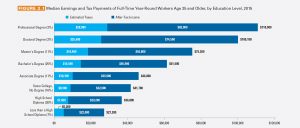

When you’re working paycheck to paycheck and struggling to make ends meet, money can be a big incentive to return to college. But the benefits of earning a degree go far beyond economic security. People who graduate from college are more likely to enjoy better health and a more fulfilling life.
These findings come from the College Board study, “Education Pays,” which illustrates the benefits of higher education for people and society. The 2016 study uncovered positive impacts on all facets of life.
Let’s look at some of the benefits a college education can bring.
1. You’ll feel more economically secure after going back to college.
Although going back to college has myriad benefits, we naturally have to begin with one of the most obvious reasons people go back to earn a degree:
Greater earnings. College is a financial investment, and before you commit, you’ll want to know if you will see a substantial return on that investment.
The chances are good that you will. Just take a look at how earning power increases with each rung of the higher education ladder:
- Individuals with some college but no degree earned 12% more than high school graduates working full time year-round.
- Individuals with associate degrees earned 25% more than those with only a high school diploma.
- Bachelor’s degree recipients working full time took home 67% more annually than people with high school diplomas.
Bachelor’s degree recipients took home 60% more annually than people with high school diplomas.
Gaining and keeping employment. College graduates tend to find employment at a higher rate and stay employed longer. Look at how the odds tip in your favor with each level of higher education you acquire.
Following is the employment rate for adults between the ages of 25 and 64 by education level:
- High school diploma: 68%
- Some college but no degree: 72%
- Associate degree: 77%
- Four-year degree: 83%
The correlation is clear—higher education equals higher employment.
In fact, the unemployment rate for individuals with at least a bachelor’s degree has consistently been about half the unemployment rate for high school graduates.
Of course, the economy is like a roller coaster—one that leaves everyone vulnerable to recessions and dips in the job market. But studies indicate that in the event of a recession, college grads are more likely to retain their jobs.
Furthermore, if college grads are downsized, they’re far more likely to find new jobs sooner.
These are the findings for today, but what about tomorrow? One trend that’s clear is the increasing importance of a higher education for gaining employment and, conversely, the depreciating value of a high school diploma. The percent of high school graduates who enroll in college increased from 51% in 1975 to 69% in 2015.

Source: Education Pays 2016 by College Board
The study says, “Earning a bachelor’s degree or a graduate degree leads to the highest earnings, the lowest unemployment rates, and the widest range of career opportunities.”
Explore UW Flexible Option degree programs
Get a UW Flexible Option Degree Guide
Download an introductory guide (PDF) to the self-paced, competency-based UW Flexible Option programs, including details about costs, admission requirements, and more.
2. You’ll live a healthier lifestyle.
Financial health is great, but your physical health matters most. In general, higher education is linked with healthier choices. Here are some of the ways that earning a degree positively correlates with improved health and overall life expectancy:
Greater access to health insurance. More bachelor’s degree holders (38%) were covered by employer-provided health insurance in 2015 than high school graduates (26%).
69% of four-year college graduates reported exercising vigorously at least once a week.
More exercise. Exercise rates are higher for bachelor’s degree holders. In 2014, 62% of individuals with at least a bachelor’s degree—versus 40% of high school graduates—reported meeting the federal guidelines for physical activity of at least 2 ½ hours a week of moderate or 1 1/4 hours of intensive aerobic activity.
Other healthy behaviors. The smoking rates among college graduates are “significantly lower” than rates among others. And while obesity levels continue to increase overall in America, the largest increases in 2011-2014 were for high school graduates — as much as 22 percentage points above those with at least a bachelor’s degree.
3. You’ll be more fulfilled.
Emotional, spiritual, intellectual, and social factors play a huge role in your overall happiness. Those with bachelor’s degrees are more likely to pursue activities that increase one’s quality of life, such as being an engaged citizen.
Greater civic involvement. Volunteerism can bring immense satisfaction in life. Among those with at least a bachelor’s degree, 39% volunteered in 2015, compared with 16% of those with a high school diploma.
Educational activities. The benefits of earning a college degree extend to other family members. The children of degree holders are more likely to engage in a wide variety of educational activities with the family and are more likely to pursue a college education.
“Right,” you may be thinking. “But I work for a living and raise a family. How am I supposed to fit school into a schedule already bursting at the seams?”
The good news is, you have options and you are not alone. According to the National Center for Education Statistics, in 2015, there were 8.1 million students aged 25 or older. That’s 41% of all college students! This sizable adult student population is changing the face of higher education as public and private institutions alike race to develop new formats and delivery methods suited to meet their unique needs.
Today, 41% of those enrolled in higher education are over the age of 25.
For example, online degree programs have become ubiquitous in response to adult learners’ demand for flexible schedules. Within the University of Wisconsin System alone, more than 100 online programs are available. Among those, nine are in the innovative, competency-based format called UW Flexible Option. The rise of these competency-based education programs has the potential to revolutionize higher education for returning adult learners.
These student-centered programs break from traditional college programs primarily in the way they measure student progress. Instead of focusing on the credit hour, or how much time students spend learning, competency-based education programs measure progress and award credit based on whether a student has gained key competencies—essential skills and knowledge.
Explore UW Flexible Option degree programs
Students in competency-based education programs are free to work at their own pace, moving more quickly through familiar material and taking extra time with material they still need to learn. In addition, competency-based education programs allow students to use their existing skills and knowledge, gained through prior education and learning experiences, to pass assessments and advance more quickly through their programs.
Freed from the rigid semester schedules and one-size-fits-all curricula of traditional college programs, adult learners in competency-based education programs now have a new, more convenient and personalized way to earn the degrees they need to get ahead. But as the research shows, a college education can mean much more than a way to boost your income. Consider it a way to transform your life.
To find out more about competency-based education and the UW Flexible Option, follow the link below or talk with a Flexible Option Enrollment Adviser at 1-877-895-3276.
UW Flexible Option Student Stories
Why One Busy Nurse Chose the UW Flexible Option’s RN to BSN Program
CT Technologist Finds New Challenges, Direction with Competency-Based Diagnostic Imaging Program
A Lifetime as a Computer Wiz, and Soon an Information Science and Technology Degree to Show for It
